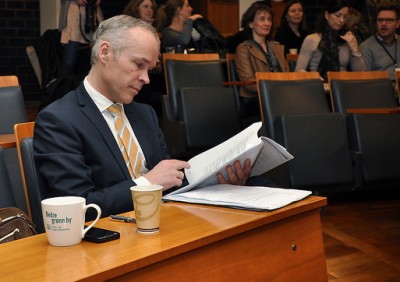Jan Tore Sanner, dubbed by some as Norway’s new “super minister” because of his wide range of government responsibility, worries that confusing language is at the core of complaints over public sector service. He’s launching a new effort to clean up state and local government’s complicated bureaucratic communication that’s often difficult to understand even for those most proficient in Norwegian.

Sanner told newspaper Dagsavisen on Monday that unusual vocabulary, legal expressions and long, heavy sentences cause problems for hundreds of thousands of Norwegians every day. Their confusion is also costing at least NOK 300 million a year, he said.
“One out of three Norwegians have problems understanding what’s written in public documents and letters,” Sanner, who represents the Conservative Party, told Dagsavisen. “Half of those who don’t understand end up calling for help.”
Attempts to answer
As kommunal minister (the minister in charge of Norway’s kommuner, or municipalities), Sanner is responsible for all aspects of how the municipalities carry out government services funded by the state. The new name for his ministry includes the word “modernization” and has long stressed a need for renewal and improvements. Sanner hopes his ministry can finally help tackle it.
“All of these calls for help over confusing language are costing the public sector a minimum of 300 million kroner every year,” he said. He wants state and local government workers to be able to use their time “on other things than answering questions” about the content of their communication.
He’s offering to fund a pilot project to simplify language in Norway’s 428 local governments. He wants local bureaucrats to make a conscious effort to express themselves more clearly.
Legal hurdles
Hogne Hove, assistant director of the local planning and zoning department in Oslo, which generates lots of questions and complaints from the public, said he looks forward the launch of a two-year program aimed at simplifying language in public documents. He said the biggest obstacle is the department’s need to use lots of legal terminology.
“Our language is infected by legal terms, and the planning and building laws are quite complicated,” Hove told Dagsavisen. “At the same time, we must ensure that everything we write is legally correct.” He admitted that attempts to address complaints over a lack of clarity often have resulted in the documents becoming even more complicated and unclear. “That’s what we have to end,” Hove said.
Sanner’s new effort will be carried out in practice by the organization representing the municipalities, KS. It’s far from the first time that politicians and bureaucrats have tried to address “bureaucratese” within the Norwegian public sector. Complaints have raged for years over complicated language regarding rules and regulations on everything from tax forms to the websites of state welfare agency NAV and immigration agency UDI. Bureaucrats like Hove, though, seem to realize that methods of communication must be improved.
“The laws have become incredibly complicated, but there must be something we can do,” Hove said. “We must try to make them understood.”
newsinenglish.no/Nina Berglund

